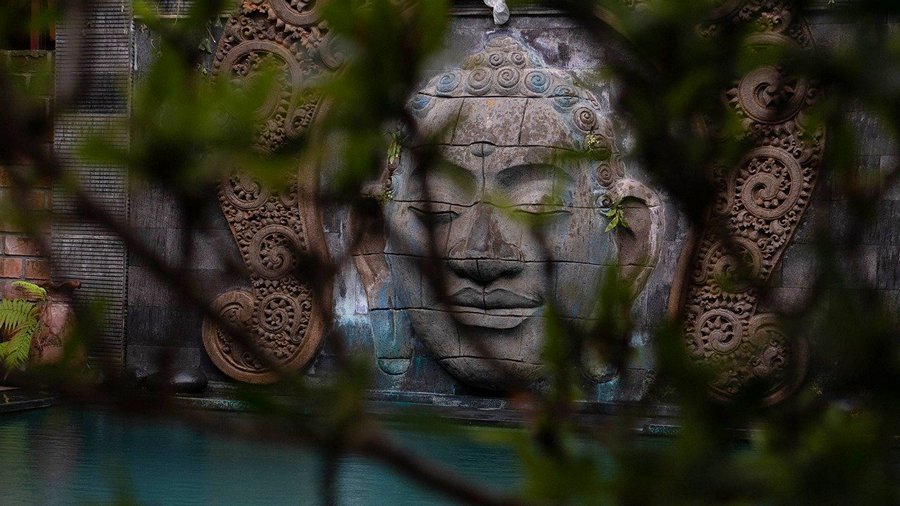…Then the Kosalan King Pasenadi approached the nun Khemā, and after approaching and worshipping the nun Khemā, he sat down on one side.
While sitting on one side the Kosalan King Pasenadi said this to the nun Khemā:
“How is it, Noble Lady, does the Realised One exist after death?”
“This has not been answered, Great King, by the Fortunate One: ‘Does the Realised One exist after death?’”
“But how is it, Noble Lady, does the Realised One not exist after death?”
“This has not been answered, Great King, by the Fortunate One: ‘Does the Realised One not exist after death?’”
“How is it, Noble Lady, does the Realised One exist and not exist after death?”
“This has not been answered, Great King, by the Fortunate One: ‘Does the Realised One exist and not exist after death?’”
“But how is it, Noble Lady, does the Realised One neither exist nor not exist after death?”
“This has not been answered, Great King, by the Fortunate One: ‘Does the Realised One neither exist nor not exist after death?’”
“‘How is it, Noble Lady, does the Realised One exist after death?’ – when there is this question, you say: ‘This has not been answered, Great King, by the Fortunate One: “Does the Realised One exist after death?”’
‘But how is it, Noble Lady, does the Realised One not exist after death?’ – when there is this question, you say: ‘This has not been answered, Great King, by the Fortunate One: “Does the Realised One not exist after death?”’
When there is this question, you say: ‘This has not been answered, Great King, by the Fortunate One: “Does the Realised One exist and not exist after death?”’
‘How is it, Noble Lady, does the Realised One neither exist nor not exist after death?’ – when there is this question, you say: ‘This has not been answered, Great King, by the Fortunate One: “Does the Realised One neither exist nor not exist after death?” ’
What is the cause, Noble Lady, what is the reason, why does the Fortunate One not answer this?”
“Now then, Great King, here I will ask you something in return, as you see fit, so you should answer.
What do you think, Great King, do you have a mathematician, or a calculator or an accountant who is able to count the amount of sand in the Ganges, saying: there is this much sand, or there are so many hundreds of grains of sand, or there are so many thousands of grains of sand, or there are so many hundreds of thousands of grains of sand?”
“Certainly not, Noble Lady.”
“But do you have a mathematician, or a calculator or an accountant who is able to measure the water in the great ocean, saying: there are this many gallons of water, or there are this many hundreds of gallons of water, or there are this many thousands of gallons of water, or there are this many hundreds of thousands of gallons of water?”
“Certainly not, Noble Lady. What is the cause of that? Great is the ocean, Noble Lady, deep, immeasurable, hard to fathom.”
“Just so, Great King, through knowing whatever bodily form a Realised One can be known by, that form the Realised One has abandoned, cut off at the root, made a palm stump, made unviable, so that by nature it is unable to rise again in the future.
The Realised One, Great King, is free from being considered as bodily form, he is deep, immeasurable, hard to fathom, like the great ocean.
‘Does the Realised One exist after death?’ does not apply,
‘Does the Realised One not exist after death?’ does not apply,
‘Does the Realised One exist and not exist after death?’ does not apply,
‘Does the Realised One neither exist nor not exist after death?’ does not apply.…
Read the complete translation of SN 44.1 Khemāsutta: Khemā Therī’s Wisdom by Bhikkhu Ānandajoti on Ancient-Buddhist-Texts.net. Or read a different translation on SuttaCentral.net, DhammaTalks.org, DhammaTalks.org or Ancient-Buddhist-Texts.net. Or listen on PaliAudio.com or SC-Voice.net. Or explore the Pali on DigitalPaliReader.online.
Or read a translation in Deutsch, বাংলা, Français, Bahasa Indonesia, 日本語, မြန်မာဘာသာ, Norsk, Русский, සිංහල, ไทย, Tiếng Việt, or 汉语. Learn how to find your language.

 All translations by Ānandajoti Bhikkhu are subject to the
All translations by Ānandajoti Bhikkhu are subject to the 



